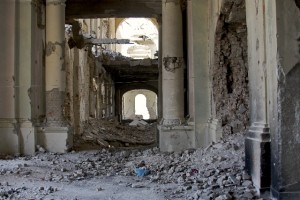With “Under Siege”, we begin this last quarter of the year with a cycle of debates on contemporary sieges, a project that also aims to denounce military conflicts that are unresolved, forgotten and even hidden from public opinion.
“Under Siege” consists of an installation comprised by two audiovisual works by the artists Mariam Ghani and Omer Fast, together with a series of conversations about the concept of the siege. The installation was opened to the public on the 16th September with a session titled “Working under Siege”, which took the form of a dialogue between the curator Chus Martínez and the Afghanistan-born artist Mariam Ghani about the possibility of artistic creation in a state of siege.
The cycle also discusses one of today’s most paradigmatic cases of the siege in “Gaza. The Permanent Siege“. Ahron Bregman, a former soldier in the Israeli Defence Forces and presently a lecturer at King’s College, London, will be presenting his most recent book La ocupación (Crítica, 2014 – published in English as Cursed Victory: A History of Israel and the Occupied Territories, 2014, Allan Lane). On the basis of his own experience and study of high-level Israeli classified documents, among other privileged sources, he condemns his country’s policy in Gaza Strip.
From the siege as understood in the classical acceptance of the word, the debate moves on to describe a key element in contemporary warfare with the session titled “Drones. Siege at a Distance”. With its use of drones, technology definitively breaks with the physical and moral proximity between attacker and victim, in such a way that killing becomes a less costly, aseptic, effortless task-at-a-distance. What does this use of drones mean on the political, military and ethical scales? A documentary, Drone (2014), directed by the Norwegian film-maker Tonje Hessen Schei and bringing together the testimonies of both victims of drone attacks and their pilots, is to be premiered in this session. Chris Woods, a British journalist and expert on drones will speak with Hessen in a discussion moderated by the journalist Jordi Pérez Colomé.
Finally, in the session titled “Syria. Information under Siege”, moderated by the journalist Lali Sandiumenge, another essential aspect of the contemporary siege will be analysed, namely the power of information and the importance of the digital media in making it available to the general public. The Syrian researcher and activist Leila Nachawati has studied a range of citizens’ initiatives in her birthplace. These have found a potent weapon against the Syrian regime in the form of the social media, and she documents this in the database Syria Untold. Then Marc Marginedas, a war correspondent for the newspaper El Periódico, inquires into the change of direction in the Syrian conflict after the irruption therein by the group of Iraqi origins called Islamic State (IS) and their strategy of targeting international journalists.
“Under Siege” is the counterpoint of the “Open City” cycle of debates with which the CCCB opened 2014, and also its contribution to the commemoration of the Tricentenari – the three-hundredth anniversary of the siege of Barcelona. These are two cycles of debate which, from opposite starting points, uphold freedom as an essential value of human existence, and draw attention to the responsibility of all of us in the task of safeguarding it.









